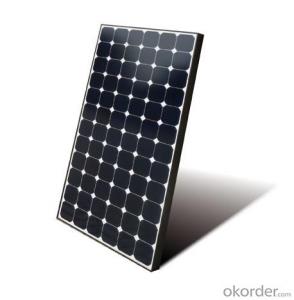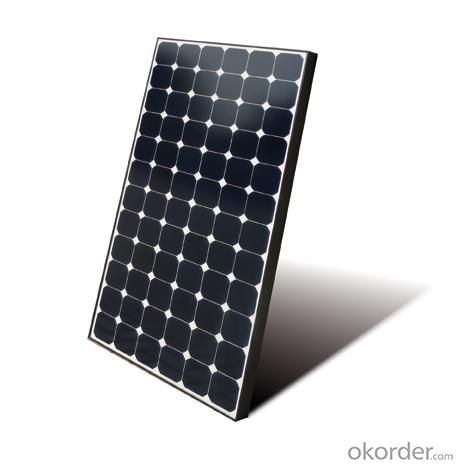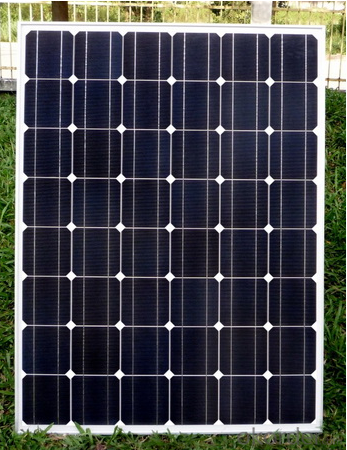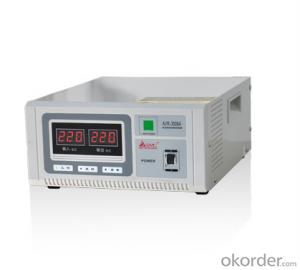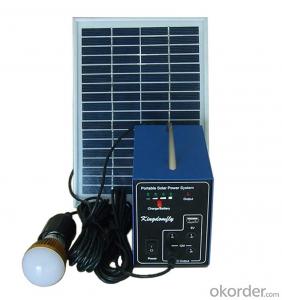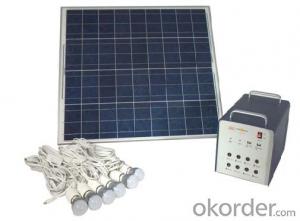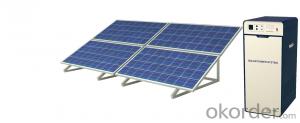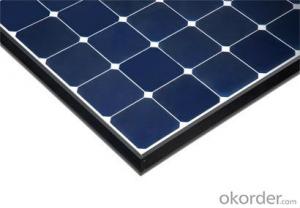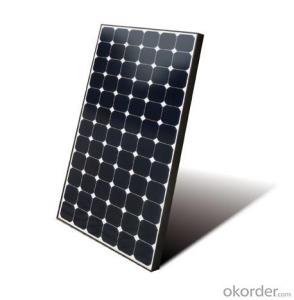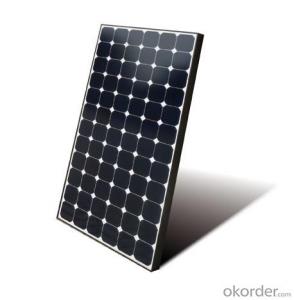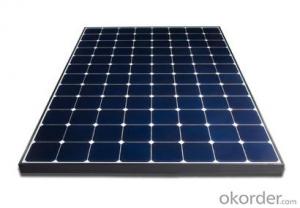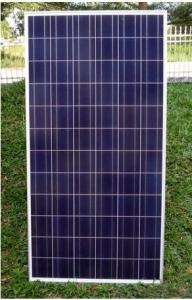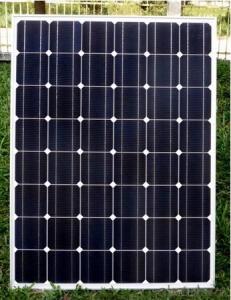Solar Energy Systems Dealers - CNBM On Grid System 15KW with Certificate UL TUV CE
- Loading Port:
- Shanghai
- Payment Terms:
- TT OR LC
- Min Order Qty:
- 100 watt
- Supply Capability:
- 1000 watt/month
OKorder Service Pledge
OKorder Financial Service
You Might Also Like
Specification
CNBM On Grid System 10KW with Certificate UL TUV CE
Product description
They range from small residential and commercial rooftop systems to large utility-scale solar power stations. Unlike stand-alone power systems, a grid-connected system rarely includes an integrated battery solution, as they are still very expensive. When conditions are right, the grid-connected PV system supplies the excess power, beyond consumption by the connected load, to the utility grid.
Connection of the photovoltaic power system can be done only through an interconnection agreement between the consumer and the utility company. The agreement details the various safety standards to be followed during the connection.[4]
Bypass diodes may be incorporated or used externally, in case of partial module shading, to maximize the output of module sections still illuminated.
Grid-connected PV systems are comparatively easier to install as they do not require a battery system.[1][6]
Grid interconnection of photovoltaic (PV) power generation systems has the advantage of effective utilization of generated power because there are no storage losses involved.[7]
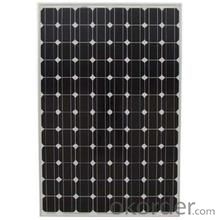
Application
Industrial
Commercial
Residential
Feature
Residential, grid-connected rooftop systems which have a capacity more than 10 kilowatts can meet the load of most consumers.[2] They can feed excess power to the grid where it is consumed by other users. The feedback is done through a meter to monitor power transferred. Photovoltaic wattage may be less than average consumption, in which case the consumer will continue to purchase grid energy, but a lesser amount than previously. If photovoltaic wattage substantially exceeds average consumption, the energy produced by the panels will be much in excess of the demand. In this case, the excess power can yield revenue by selling it to the grid. Depending on their agreement with their local grid energy company, the consumer only needs to pay the cost of electricity consumed less the value of electricity generated. This will be a negative number if more electricity is generated than consumed.[3] Additionally, in some cases, cash incentives are paid from the grid operator to the consumer.
Packaging
With carton and box
- Q: Can solar energy systems be used for outdoor lighting?
- Yes, solar energy systems can definitely be used for outdoor lighting. Solar panels can be installed to capture sunlight during the day and convert it into electrical energy. This energy can then be stored in batteries and used to power outdoor lights during the night. This approach is not only environmentally friendly but also cost-effective as it eliminates the need for traditional grid electricity.
- Q: How does the angle of solar panels affect their efficiency?
- The angle of solar panels greatly affects their efficiency. By adjusting the angle of the panels to match the latitude of their location, they can maximize their exposure to the sun's rays. Tilting the panels towards the sun helps to capture more sunlight throughout the day, resulting in increased energy production. A proper alignment ensures that the panels receive optimal sunlight, leading to improved efficiency and higher energy generation.
- Q: Can a solar energy system be used in areas with high levels of snowfall?
- Solar energy systems can indeed be utilized in regions with heavy snowfall, despite the temporary reduction in efficiency caused by snow coverage and sunlight obstruction. Overcoming this challenge is achievable through various methods: 1. Opting for tilted panels: Installing solar panels at an incline allows snow to easily slide off, enabling the panels to consistently generate electricity. This approach is particularly effective when panels are set at a steeper angle. 2. Snow clearance: In areas experiencing frequent snowfall, periodic removal of snow from the panels may be necessary. This task can be accomplished either manually or through automated systems like brushes or heating elements that melt the snow. 3. Increased panel surface area: By adding more panels, the system can compensate for reduced efficiency during snowy periods. This ensures sufficient energy production even if some panels are covered in snow. 4. Utilizing net metering: In regions with heavy snowfall, net metering can be employed to offset the decreased solar energy production during winter months. Surplus energy generated during sunny periods can be exported to the grid, while energy can be drawn from the grid during lower production periods. 5. Incorporating battery storage: By integrating battery storage into the solar energy system, excess energy generated during sunny periods can be stored for use when the panels are covered in snow. This guarantees a continuous supply of electricity, irrespective of snowfall affecting immediate production. Though snowfall poses challenges for solar energy systems, they can still be effectively employed in snowy areas with proper design, installation, and maintenance. Technological advancements and innovative solutions continue to enhance the resilience and performance of solar energy systems in snowy conditions.
- Q: Can solar energy systems be used in powering hotels or resorts?
- Yes, solar energy systems can certainly be used to power hotels or resorts. Solar power is a clean and renewable energy source that can provide ample electricity to meet the energy demands of hotels and resorts. These establishments typically require a significant amount of energy for various purposes such as lighting, heating, cooling, and operating electrical appliances and equipment. Installing solar panels on the rooftops or in open areas of hotels and resorts can allow them to harness the abundant sunlight and convert it into electricity. This electricity can be used to power the entire facility, reducing the reliance on traditional energy sources and lowering the carbon footprint. In addition to being environmentally friendly, solar energy systems can also provide financial benefits to hotels and resorts. By generating their own electricity, these establishments can reduce or even eliminate their utility bills, resulting in substantial cost savings over time. Moreover, some countries offer incentives, grants, or tax credits for implementing solar power systems, further enhancing the economic viability of such installations. Furthermore, the availability of solar energy is not limited to sunny days. With advancements in technology, solar panels can still generate electricity even during cloudy or overcast conditions. Additionally, excess energy produced during peak sunlight hours can be stored in batteries for later use, ensuring a consistent power supply throughout the day and night. By adopting solar energy systems, hotels and resorts can showcase their commitment to sustainability and environmental responsibility. This can be a valuable marketing tool, attracting eco-conscious guests who prefer environmentally friendly accommodations. It also aligns with the growing trend of sustainable tourism, which can enhance the reputation and competitiveness of these establishments in the industry. Overall, solar energy systems are a viable and efficient solution for powering hotels and resorts. They offer numerous benefits, including reduced utility costs, environmental sustainability, and enhanced market appeal. As the technology continues to evolve and become more affordable, more and more hotels and resorts are embracing solar power as a clean and reliable energy source.
- Q: How do solar energy systems impact the reduction of fossil fuel consumption?
- The reduction of fossil fuel consumption is greatly influenced by solar energy systems. One of the key benefits of solar energy is its utilization of the sun's power, which is a renewable energy source. This implies that solar energy systems do not rely on the burning of fossil fuels like coal or natural gas to generate electricity. By adopting solar energy, we can decrease our dependence on fossil fuels for electricity generation, thereby reducing our carbon footprint and addressing the negative environmental consequences associated with fossil fuel consumption. Additionally, solar energy systems contribute to the reduction of fossil fuel consumption through net metering. Net metering allows individuals or businesses with solar panels to sell any excess electricity generated back to the grid. This means that when solar energy production is high and exceeds the amount being used, the surplus energy is fed into the grid. Consequently, the need for fossil fuel-based power plants to produce electricity to meet demand decreases, resulting in an overall reduction in fossil fuel consumption. Moreover, the adoption of solar energy systems can lead to a decrease in the demand for fossil fuel-based electricity, which can subsequently drive down electricity prices. This price reduction enhances the economic competitiveness of renewable energy, encouraging greater adoption of solar energy systems and further decreasing the demand for fossil fuels. In conclusion, solar energy systems play a crucial role in reducing fossil fuel consumption. By harnessing the sun's energy, solar power systems eliminate the necessity of burning fossil fuels for electricity generation. Through net metering and the potential for price reductions, solar energy systems contribute to the overall reduction of fossil fuel consumption, promoting a cleaner and more sustainable energy future.
- Q: Can a solar energy system be installed in an area with heavy snowfall?
- Yes, a solar energy system can be installed in an area with heavy snowfall. However, it is important to consider certain factors. Snow can reduce the efficiency of solar panels by blocking sunlight, so the panels should be angled properly to allow snow to slide off easily. Additionally, regular snow removal and maintenance may be required to ensure optimal performance during the winter months.
- Q: What is the environmental impact of using solar energy systems?
- Solar energy systems have a significantly lower environmental impact compared to traditional energy sources. The primary environmental benefits of using solar energy include reduced greenhouse gas emissions, minimized air and water pollution, conservation of natural resources, and decreased reliance on fossil fuels. Additionally, solar energy systems have a relatively low ecological footprint and are renewable, making them crucial for transitioning towards a more sustainable energy future.
- Q: Can solar energy systems be used in powering airports or transportation hubs?
- Solar energy systems have the capability to power airports and transportation hubs. By installing solar panels, we can harness renewable and sustainable energy from the sun. These panels can be positioned on airport buildings' roofs, parking lots, or the surrounding ground. The utilization of solar energy in airports and transportation hubs is multifaceted. It can generate electricity to power lighting systems, security cameras, and other electrical equipment within the airport premises. Solar power can also be used to charge electric vehicles like electric buses or airport shuttles. This promotes a cleaner transportation system and reduces carbon emissions. In addition, solar energy systems serve as a reliable backup power source during emergencies or power outages. This is particularly crucial for airports, as continuous operations and safety measures must be maintained. Recently, various airports worldwide have adopted solar energy to decrease their carbon footprint and operating expenses. For example, Cochin International Airport in India achieved the distinction of being the world's first completely solar-powered airport in 2015. It generates surplus electricity that can be returned to the grid. Overall, integrating solar energy systems into airports and transportation hubs is both environmentally friendly and economically advantageous in the long term. It diminishes reliance on fossil fuels, reduces energy costs, and contributes to a more sustainable and greener transportation infrastructure.
- Q: Can solar energy systems be used in areas with high levels of vandalism or theft?
- Yes, solar energy systems can still be used in areas with high levels of vandalism or theft. However, additional security measures such as installing sturdy fences, security cameras, and alarm systems can be implemented to deter potential thieves or vandals and protect the solar panels and equipment. Additionally, community engagement and education programs can be helpful in raising awareness about the benefits of solar energy and discouraging theft or vandalism.
- Q: Do solar energy systems require a backup battery system?
- Depending on your specific needs and circumstances, it may be beneficial to have a backup battery system for your solar energy system. Solar energy systems generate electricity from the sun and can be connected to the grid, allowing excess energy to be sold back to the utility company. This means that even during times when the sun is not shining, such as at night or during cloudy weather, you can still draw electricity from the grid. However, there are several advantages to having a backup battery system. Firstly, it enables you to store excess energy generated during the day for use at night or during power outages. This ensures a reliable source of electricity even when the grid is down. Moreover, a backup battery system provides a more consistent power supply. When connected to the grid, solar energy systems typically shut down during power outages to protect utility workers. But with a backup battery system, you can continue powering your essential appliances and devices during these outages. Additionally, having a backup battery system promotes energy independence. By storing your own energy, you can reduce dependence on the grid and potentially further offset electricity bills. Ultimately, the decision to install a backup battery system for your solar energy system depends on your specific energy needs, budget, and preferences. Seeking guidance from a solar energy professional can help you determine the best solution for your situation.
Send your message to us
Solar Energy Systems Dealers - CNBM On Grid System 15KW with Certificate UL TUV CE
- Loading Port:
- Shanghai
- Payment Terms:
- TT OR LC
- Min Order Qty:
- 100 watt
- Supply Capability:
- 1000 watt/month
OKorder Service Pledge
OKorder Financial Service
Similar products
Hot products
Hot Searches
Related keywords
